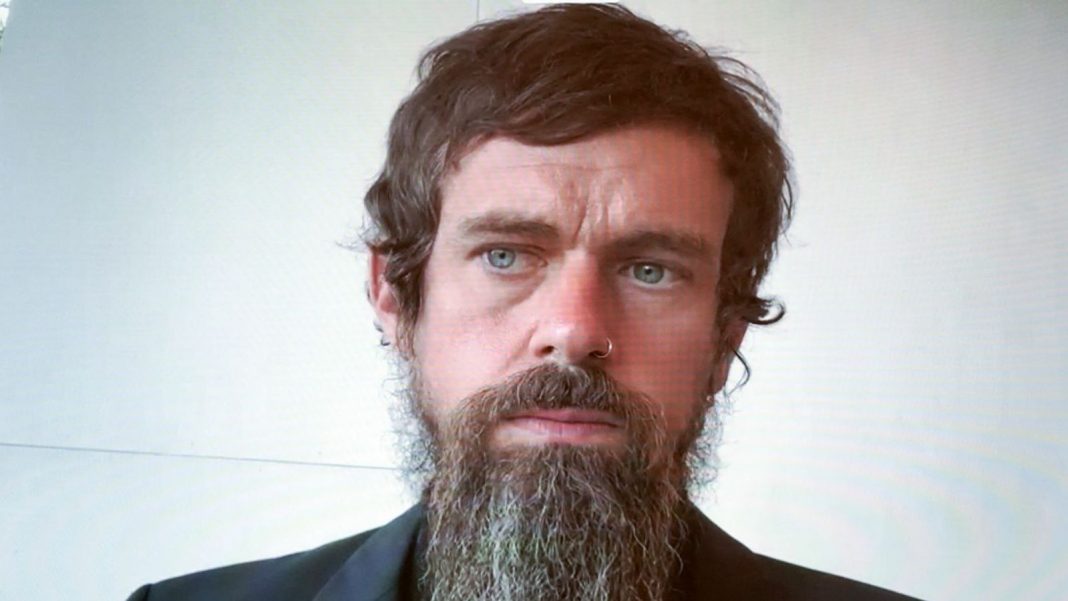As Elon Musk drags Twitter and its users through more and more turbulence, its founder Jack Dorsey has made a supportive observation from the sidelines.
He posted that “Running Twitter is hard” and “it’s easy to critique the decisions from afar”.
The 46-year-old billionaire left the platform he co-founded in 2006 to launch what he calls a “decentralised” alternative, which looks a lot like Twitter.
But while Dorsey rolls out Bluesky Social and continues to sing the praises of Bitcoin, Twitter users are left at the whim of his former favourite Tweeter.
Here Sky News looks at how Twitter’s founder got to where he is.
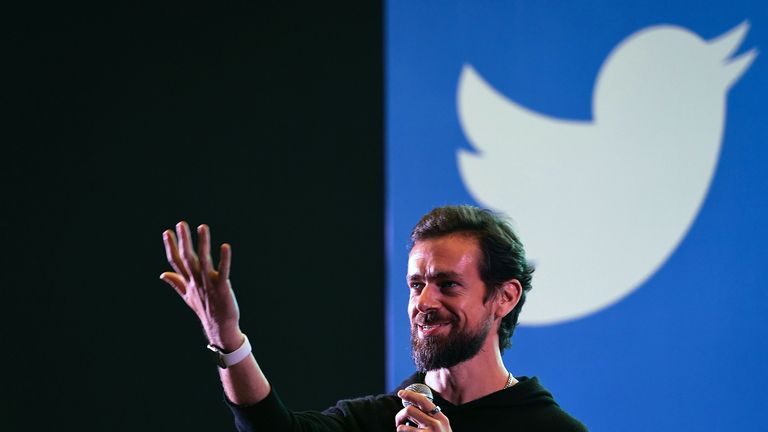
Addressing students at the Indian Institute of Technology
Self-made taxi dispatch developer
Dorsey was born in St Louis, Missouri in 1976. His father developed spectrometers.
By the time he was 14 he’d developed an unusual interest in the software that dispatches taxis.
He went to the University of Missouri-Rolla at 19 and transferred to New York University two years later, but dropped out a semester before he was due to graduate.
Instead he moved to California, where he created his own company to send out taxis, couriers and emergency service vehicles via the internet.
While working as a programmer for the dispatch platform in 2000, he decided he wanted to create a messaging service to update his friends on what he was doing – without having to sit in front of a computer.
He approached a podcasting company called Odeo, where he got a job alongside Christopher ‘Biz’ Stone, Evan Williams and Noah Glass – who would become his Twitter co-founders.
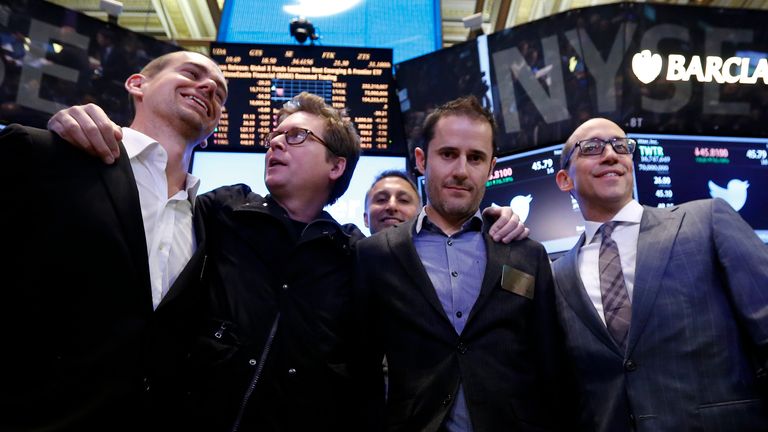
Twitter co-founders Dorsey (left), Biz Stone (second left) and Evan Williams celebrate stock exchange listing with Dick Costolo in 2013
Although Dorsey had been inspired by instant messaging platforms such as AOL and MSN, he and Stone decided a text-based service would better suit his status-update idea.
In two weeks they’d built a prototype for Twitter.
When Odeo went out of business in 2006, Dorsey returned to the messaging idea and officially launched ‘Twittr’ in March that year, making himself chief executive.
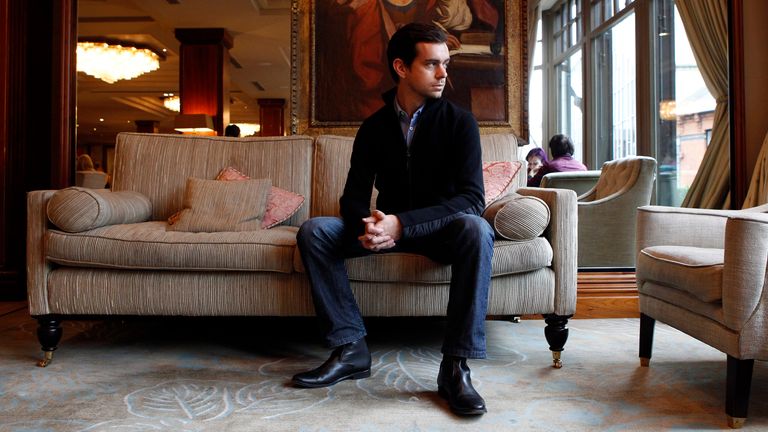
Dorsey in October 2010
Overnight billionaire
Dorsey secured the support of venture capitalists and as celebrities signed up the app grew in popularity.
Two years later, Dorsey moved from chief executive to chairman of the board, reportedly having often left work early to prioritise hobbies such as yoga and fashion design.
When he was younger he briefly dabbled with modelling.
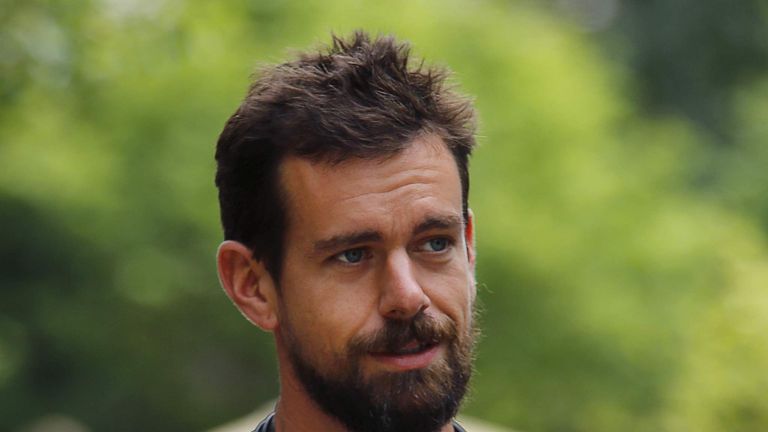
Seen in 2016
In 2009 he courted controversy after joining a US State Department trip to Iraq. Designed to rebuild tech hopes there after the fall of Saddam Hussein, the trip itself was fairly uneventful.
But later that year when the Green Revolution happened, Dorsey agreed to reschedule planned maintenance to Twitter’s servers so protesters could still communicate.
It was seen as a breach of policy given President Barack Obama had promised the US would not meddle in Iraq’s affairs. Dorsey went to Russia on another State Department delegation the following year.
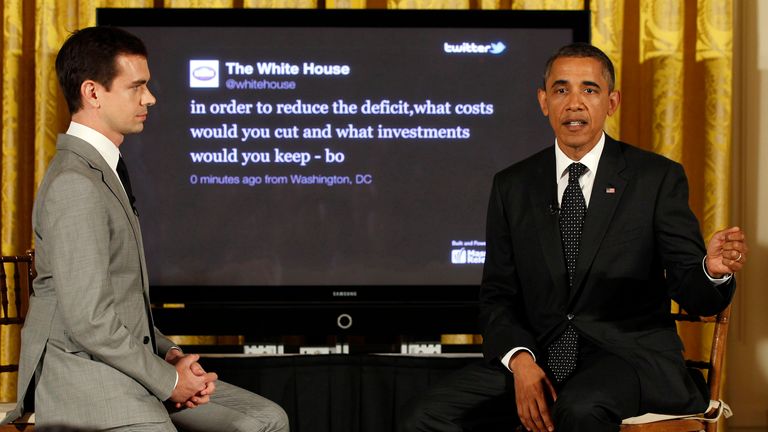
Dorsey and President Barack Obama at Twitter’s town hall in 2011
In 2011 he invited Mr Obama to Twitter’s first ever town hall – where he had to remind him to keep his answers to 140 characters.
Two years later, although it hadn’t been launched with profit in mind, Twitter became a listed company, making Dorsey an overnight billionaire.
Read more:
What is Bluesky?
Twitter appoints new chief executive
Musk asks Twitter if he should step down as CEO
When in 2015 the company’s replacement chief executive Dick Costolo announced his resignation, Dorsey returned as interim – but took up the post on a permanent basis in October.
Meanwhile back in 2010 Dorsey had begun splitting his time between Twitter and a new venture – Square – technology that transformed smartphones and tablets into debit card readers for small businesses.
But as competitors launched rival products, it began to struggle with losses of up to $100million (£79m).

Pictured in 2019
Dorsey rebranded Square ‘Block’ in 2021, in reference to his interest in Blockchain, officially giving himself the job title ‘Block Head’ in 2022.
Back at Twitter in 2016, the 140-character limit was effectively increased by no longer including links or photos in the count. The decision was a bid to attract new users – as the number of daily tweets had fallen globally.
A year later it increased again – doubling to 280 characters.
Tech moving faster than policy
In 2018, Twitter and other social media platforms began having to answer to the US government.
The first time Dorsey testified, alongside then-Facebook chief operating officer Sheryl Sandberg, he was quizzed on interference in the 2016 presidential election.
Hours of questioning saw Dorsey post a picture of his heartrate on Twitter. The platform was also accused of anti-Conservative bias, share prices fell, and the decision was made to ban all political advertising the following year.
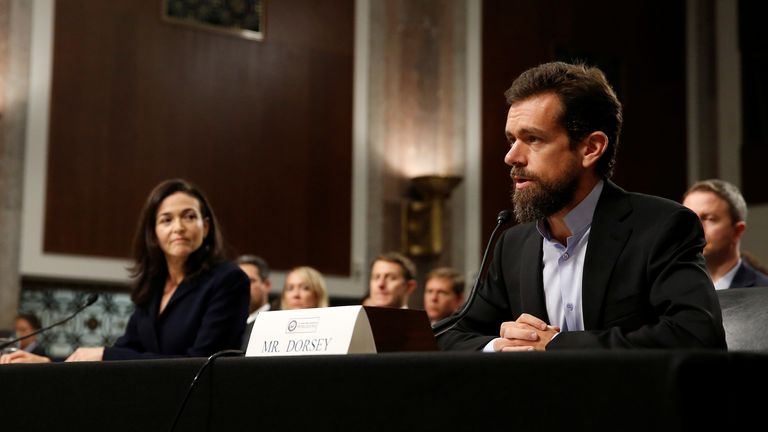
Dorsey and Facebook’s Sheryl Sandberg give evidence to Congress in 2018
During his time in office, Dorsey met with President Donald Trump, who had expressed concern his followers were being removed.
Dorsey oversaw misinformation warning labels applied to some of Mr Trump’s tweets during his 2020 election campaign and the permanent suspension of his account following the Capitol riots of January 2021.
Mr Trump set up his own platform – Truth Social, while Dorsey stuck by the ban, but also expressed concerns it set a “dangerous precedent”.
He appeared before Congress on two other occasions as Twitter boss – once in October 2020 and again the following month.
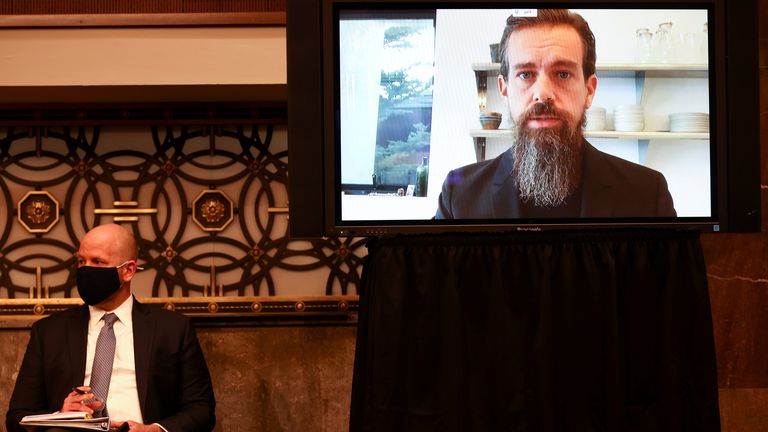
Dorsey gives evidence to Congress via videolink in 2020
The first time, in front of the US Senate Commerce Committee, he answered questions alongside Facebook and Google executives about a law that protects tech companies for being prosecuted over content generated on their platforms.
Dorsey said changing it would “collapse how we communicate on the Internet”.
The following month he gave evidence alongside Facebook founder Mark Zuckerberg on how content was moderated around the 2020 election.
When COVID emerged in 2020 the Twitter founder promised to donate $1bn (£0.79bn) of his total wealth to relief programmes.
The following year when the Delta variant hit India, he donated £15m (£11.8m) to support programmes there.
The pandemic scuppered plans he’d announced in 2019 to move to Africa. He said the continent would “define the future (especially the bitcoin one!)”.
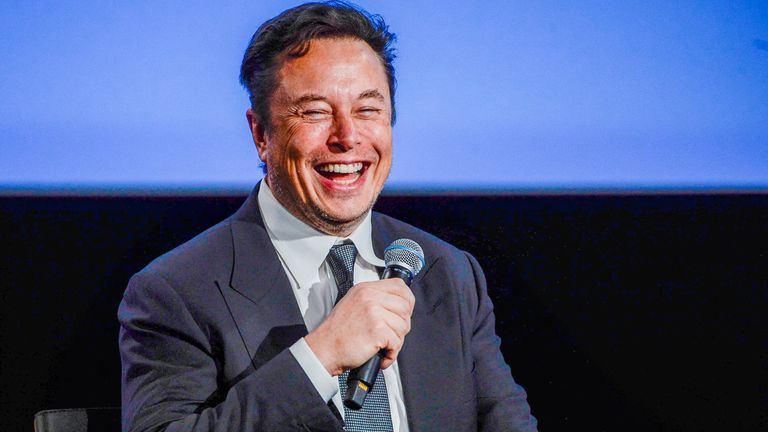
Elon Musk
Musk takes Twitter
Dorsey and Musk’s relationship predates his ill-fated takeover.
When in 2020 it was reported that one of Twitter’s investors Elliott Management was trying to replace Dorsey as chief executive, Musk tweeted his support, saying he had a “good heart”.
In return, Dorsey said Musk was one of his favourite Twitter users and that his updates “focused on solving existential problems and sharing his thinking openly”.
The founder added that he enjoyed the “ups and downs” of Musk’s use of his site – something he may have later come to regret – to which Musk replied: “Twitter rocks!”
They shared an enthusiasm for cryptocurrencies, with Dorsey describing Bitcoin – or ‘The B Word’ as he calls it – as “direct activism against an… exclusionary financial system”.
In late-2021 Dorsey announced he was leaving Twitter in a staff email posted to his account, claiming he wanted to move the firm away from its “founding and founders”.
This content is provided by Twitter, which may be using cookies and other technologies.
To show you this content, we need your permission to use cookies.
You can use the buttons below to amend your preferences to enable Twitter cookies or to allow those cookies just once.
You can change your settings at any time via the Privacy Options.
Unfortunately we have been unable to verify if you have consented to Twitter cookies.
To view this content you can use the button below to allow Twitter cookies for this session only.
Musk, believed to be the wealthiest person in the world, began buying shares in Twitter at the beginning of 2022.
By April he was the biggest shareholder, with a 9.1% stake.
He was invited to join the board of directors – and despite initially turning the role down – then made an unsolicited offer to buy the entire company for $44bn (£34.5bn).
By July, Musk had said he wanted to back out of the deal as Twitter had failed to uphold its promise of cracking down on spambot accounts.
The move triggered legal action against Musk – who just weeks before a trial was due to start in Delaware – gave in and decided to go ahead, closing the deal in November.
Musk began by firing half Twitter’s employees, including the chief executive, which then triggered mass resignations.
After a tumultuous few months in the job, in which he expressed regret for buying the platform, he has made several chaotic changes and given up the job of chief executive.

Twitter and Bluesky logos are seen in this illustration taken November 7, 2022. REUTERS/Dado Ruvic/Illustration
Beginnings of Bluesky
Dorsey, meanwhile has been working on a Twitter successor, Bluesky Social.
He started it in 2019, but soft launched it with a beta version in late-2022.
Having seen Twitter grow at dizzying speed, he is rolling out membership on an invite-only basis.
Bluesky is a “decentralised” platform, which Dorsey hopes will stop the kind of hostile concentration of power we’ve seen with Musk.
He retains a 2.4% stake in Twitter.


